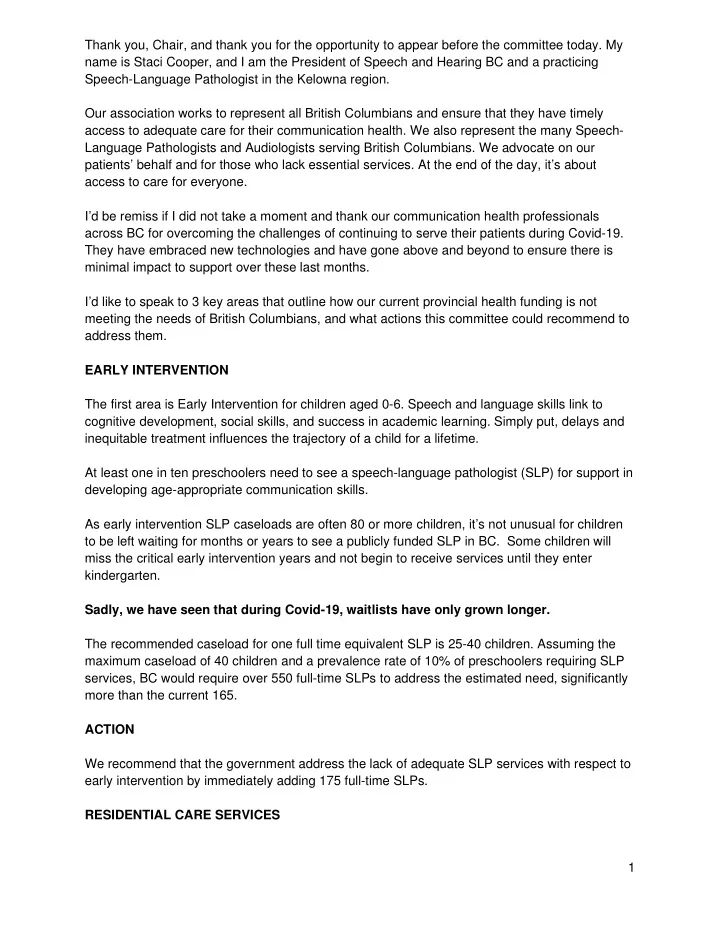

Thank you, Chair, and thank you for the opportunity to appear before the committee today. My name is Staci Cooper, and I am the President of Speech and Hearing BC and a practicing Speech-Language Pathologist in the Kelowna region. Our association works to represent all British Columbians and ensure that they have timely access to adequate care for their communication health. We also represent the many Speech- Language Pathologists and Audiologists serving British Columbians. We advocate on our patients’ behalf and for those who lack essential services. At the end of the day, it’s about access to care for everyone. I’d be remiss if I did not take a moment and thank our communication health professionals across BC for overcoming the challenges of continuing to serve their patients during Covid-19. They have embraced new technologies and have gone above and beyond to ensure there is minimal impact to support over these last months. I’d like to speak to 3 key areas that outline how our current provincial health funding is not meeting the needs of British Columbians, and what actions this committee could recommend to address them. EARLY INTERVENTION The first area is Early Intervention for children aged 0-6. Speech and language skills link to cognitive development, social skills, and success in academic learning. Simply put, delays and inequitable treatment influences the trajectory of a child for a lifetime. At least one in ten preschoolers need to see a speech-language pathologist (SLP) for support in developing age-appropriate communication skills. As early intervention SLP caseloads are often 80 or more children, it’s not unusual for children to be left waiting for months or years to see a publicly funded SLP in BC. Some children will miss the critical early intervention years and not begin to receive services until they enter kindergarten. Sadly, we have seen that during Covid-19, waitlists have only grown longer. The recommended caseload for one full time equivalent SLP is 25-40 children. Assuming the maximum caseload of 40 children and a prevalence rate of 10% of preschoolers requiring SLP services, BC would require over 550 full-time SLPs to address the estimated need, significantly more than the current 165. ACTION We recommend that the government address the lack of adequate SLP services with respect to early intervention by immediately adding 175 full-time SLPs. RESIDENTIAL CARE SERVICES 1
The second area relates to full-time SLPs providing Residential Care Services. According to 2019 statistics from Speech-Language Audiology Canada, British Columbia has the third lowest number of SLPs per capita of all provinces. SLPs evaluate and treat communication and swallowing disorders that are often related to progressive neurological disorders such as; Parkinson’s disease, dementia, ALS, MS, as well as those who have suffered strokes, traumatic brain injury, head and neck cancers, and many other health problems. The current lack of access to services for identification and treatment of communication health disorders affects overall health outcomes, length of hospital stays, and quality of life. For our adult population, there are minimal treatment options as MSP does not cover rehabilitation services and publicly funded service are sparse with long waitlists. ACTION We recommend increasing the number of practicing SLPs per capita to the national average to ensure British Columbians with communication and swallowing difficulties have access to critically needed services. 200 additional publicly funded fulltime SLP positions must be added to our healthcare system for adequate service provision to those in the general community and residential care facilities. Special attention should be paid to ensure all regions in our province are receiving equitable services. HEARING AID FUNDING The third area relates to hearing aid funding. More than 10% of British Columbians experience some form of hearing loss but less than one quarter actually seek help, mainly resulting from prohibitive cost barriers. Hearing aids can be essential to maintain the ability to communicate and safely move around environments for many. When left untreated, hearing loss can lead to further social isolation and depression, and increase the risk for cognitive and physical health issues. We know the prevalence of hearing loss increases for those aged 65 and older, when most transition to a pension income. The $2,000 -8000-dollar cost for a set of hearing aids, which will require replacement every 5 years, is a major burden to a pensioner earning less than $10,000 to $20,000 annually. BC currently lags behind other provinces in providing basic financial support for hearing aids and assistive listening devices. Hearing aids are not covered under MSP with only limited third party funding. Seniors are feeling the brunt of Covid-19 to their health, including increases in social isolation and communication challenges. The government should not be contributing to these burdens. ACTION 2
We recommend the government better support BC residents by providing funding for hearing aids and assistive listening devices. There are ways this can be done to focus on those with lower income brackets. This funding will mitigate poor health outcomes associated with untreated hearing loss and ultimately reduce the burden on the health care system. Thank you for your time. I would be happy to answer any questions. 3
Recommend
More recommend